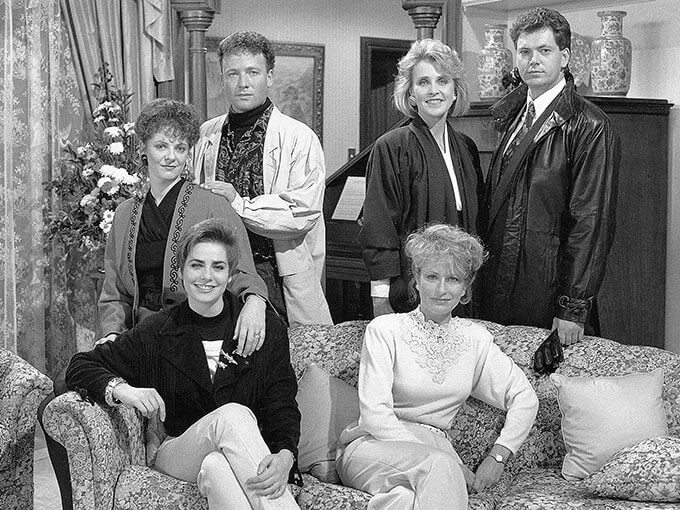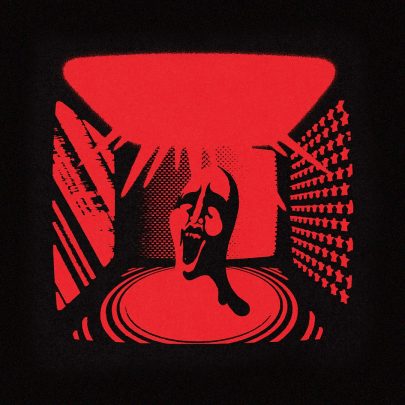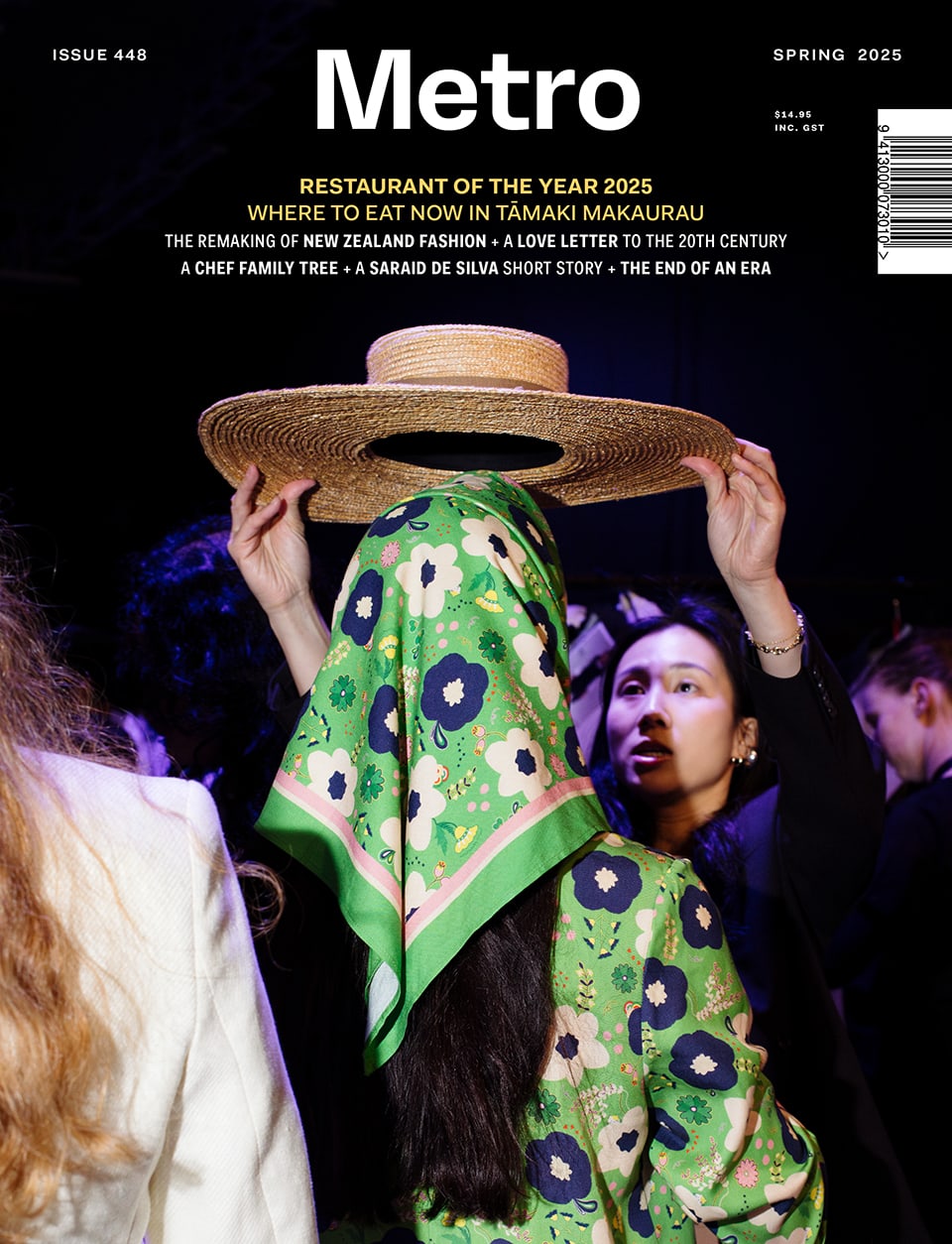Nov 23, 2017 Film & TV
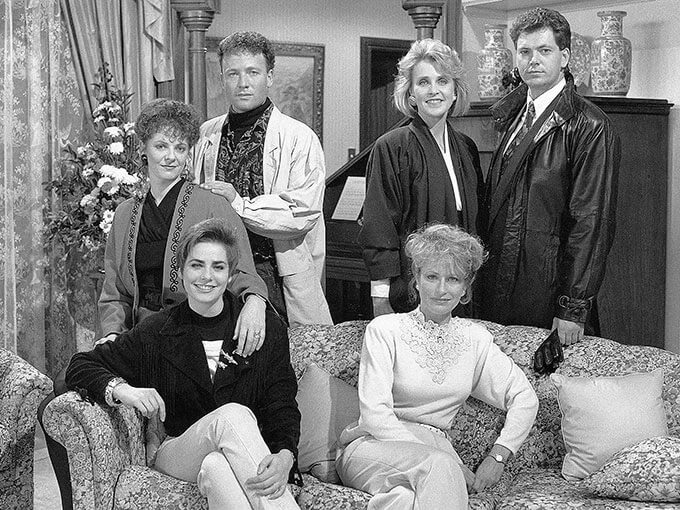
Auckland city wankers
The inside story of New Zealand’s bitchiest, best-looking and most audaciously Auckland television series, Gloss.
Created by Janice Finn and Rosemary McLeod, Gloss revolved around a high-fashion magazine edited by Maxine Redfern, and charted the conflicts between the self-made publishing queen and her ex-husband Bradley’s old-money Remuera family. An All About Eve storyline bubbled under, too, as magazine ingénue Gemma worked her way up the social ladder.
Gloss HQ was Television New Zealand’s offices in the Centrecourt building on Queen St, and the series was filmed in the broadcaster’s former studios in Browns Bay, where Shortland Street would later start out. With veteran directors such as Chris Bailey, Aileen O’Sullivan, Murray Reece, Wayne Tourell and Peter Sharp, and multiple cameras on the floor, the cast had the luxury of time and resources to hone their acting chops and push each other to be better.
The show went to air on Television Two at 8pm on Thursday, August 13, 1987, and quickly made stars of its cast. Three years later, the sweet seduction would be over; Gloss was unexpectedly canned just before its fourth season. What remains is a glittering memory: for fans, of a terribly glamorous homegrown series; for cast and crew, of the heady times being centre-stage as Auckland embraced the excesses of the 80s.
ACTOR Peter Elliott (PLAYED Rex Redfern, Bradley’s Half-Brother): It was the first time Auckland woke up and went, “Christ, it’s good to be an Aucklander.” It was greedy as hell, it was brash and noisy. Things had changed from a Lion Brown and a doobie; you could go anywhere and be offered a line. We were country bumpkins suddenly moved into this fast-paced new world.
CRAIG PARKER (JUSTIN GRIEG, FRIEND OF CHELSEA REDFERN): We’d borrow amazing clothes from wardrobe and we’d travel in a pack, just having a really good time. I’m amazed that I got to live such a hedonistic life on less money than I have ever had in my life.
MIRANDA HARCOURT (GEMMA, GLOSS JOURNALIST): It was just madness. Yalumba-fuelled madness. It was like a cocktail party all day, every day for all three seasons.
LISA CHAPPELL (CHELSEA, DAUGHTER OF MAXINE & BRADLEY): I do think yes, Miranda did maybe, possibly, dance naked on a table, somewhere in a Herne Bay apartment building. I do remember a party at Simon’s but I’m not sure we should discuss that.
SIMON PRAST (ALISTAIR, CHELSEA’S OLDER BROTHER): Well, it was the most fun you could have with or without your clothes on.
In the mid-1980s, Television New Zealand still had an in-house drama department, where everyone from writers to directors to costume designers would be trained from the ground up. With no rival, there was little imperative for the public broadcaster to deliver audiences to advertisers. New shows were more often commissioned in a casual, collaborative way, rather than driven by data.
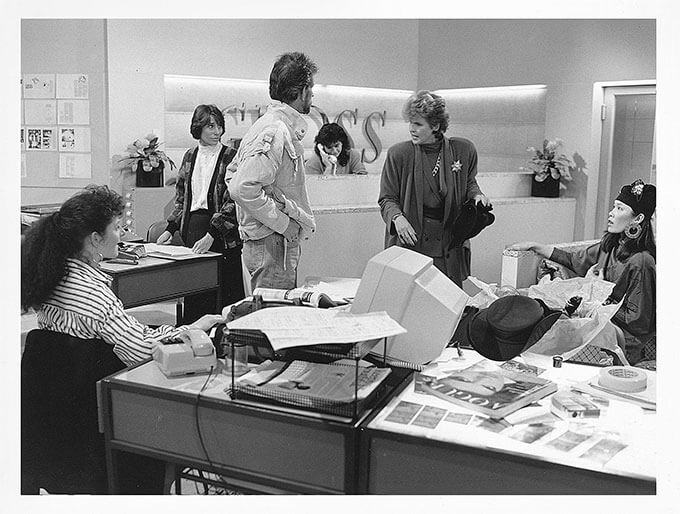
JANICE FINN (GLOSS CREATOR & PRODUCER): I’d been an actress and I’d come into TVNZ and trained as a director and producer. At the time, the dramas they were making — I was directing some of it — were quite blokey, you know, black singlets and so on. Then they wanted another weekly show.
JOHN McRAE (FORMER HEAD OF DRAMA, TVNZ): I asked Janice to come up with an idea. I asked her to produce a show that was based around a magazine. Simple as that.
JANICE FINN: I grew up in Auckland in a relatively unwealthy family, but my father had been to a private school and all their friends were wealthy, so I was an observer of that life without living it. Those sorts of things sink in. I was also terribly fond of fashion — my maternal grandmother had been a dressmaker — and I loved Dallas and Dynasty. I was reading columns by Rosemary McLeod at the time. She was so acerbic, she would say these outrageous things. I asked her to write this very vague idea I had, and I can tell you it was utterly vague. She of course knew magazines back to front, so she knew exactly where she wanted it to go. I brought up this thing about the wealth in Auckland and the families I’d observed, and then she went away and wrote it all up and there it was. Maxine and her deputy editor, Magda, were very much Rosemary’s creation. I went to John McRae with this thing and he said, “Yeah, go for it!”
CHRIS BAILEY (DIRECTOR, EPISODE ONE): He had good gut decisions, John. He was always on the money.
JAMES GRIFFIN (GLOSS SCRIPT EDITOR): I was 24 years old. I was a trainee script editor in the drama department, but this was the first big project that was handed to me. It was Janice’s debut as a producer, too, so we didn’t know anything, we just made it all up as we went along.
JANICE FINN: James and I learned on the job. You’re not terrified when you know nothing. You’re not scared at all. “Noooo. I can do that!” It’s only at the point you know stuff that you get truly terrified.
“Oh, it’s the gilt on the gingerbread, the icing on the cake / It’s monuments and mirror-glass, the city’s on the make…”
The opening-credits theme was created by composer Stephen McCurdy. The saxophone-soaked tune featured the unmistakable purr of Auckland jazz icon the late Beaver (Beverley Morrison).
JANICE FINN: I loved those lyrics, I loved the music, but when Steve played me the actual thing, I remember hearing the “Glooossss” and I said, “Nah, don’t like it.” He said ,“It’s marvellous, I’m not changing it.” “Don’t like it.” “Not changing it.” And of course, now, it’s perfect.
On the writing team were respected names such as Judy Callingham, Liddy Holloway, Judith Fyfe, Debra Daley and Ross Hastings. They threw every soap opera staple at the page — kidnappings, shootings, disappearances, affairs — and drenched it in the trappings of the rich. It was Auckland on speed.
ILONA RODGERS (MAXINE REDFERN): The ultimate scene of the first series is the wedding of Alistair and Gemma. On the day, we’re filming in a church somewhere beyond Remuera. My secretary pulls out a gun and shoots somebody, there’s blood on the church wall. Gemma rushes down the drive with blood on her wedding dress, and somebody on the street — this is in real life — comes up to us and says, “The stock market’s just crashed!” I can’t think of a better way to put the relationship between Gloss and Auckland in context.
PETER ELLIOTT: Janice had a strong handle on what she wanted. Gloss walked a very, very fine line between drama and comedy and high camp. Up until then, I think the nation had been largely scared of that sort of entertainment. We did great kidult shows, you know, Under the Mountain and Children of the Dog Star … but really, Gloss changed the world of entertainment in New Zealand.
JAMES GRIFFIN: Certainly for me it was the first show that really put drama and comedy together and created that kind of strange hybrid that we still do to this day — the Outrageous Fortunes and the Westsides — where I learned the craft of “make them laugh and make them cry in the same episode”. Before that, drama was drama and comedy was comedy.
MIRANDA HARCOURT: We would get the new scripts and just fall about laughing because they were so full of self-referential humour about what it is to be glamorous in New Zealand.
GEELING CHING (JASMINE, GLOSS FASHION EDITOR): There was one scene where Magda was trying to find a hat, probably for someone’s wedding, and my line to her was, “You can’t wear a hat — your legs are too short”, and Magda’s response was, “Short legs? Oh I might as well kill myself!” That was her Dr Ropata moment.
Finn had one overriding criterion in her casting process: they had to look good. This resulted in some unconventional choices: Geeling Ching, former lover of David Bowie. French model Brigitte Berger. Radio presenter Kerry Smith. They joined the safer bets: Transtasman heart-throb Andy Anderson. Theatre regulars Michael Keir-Morrissey, Jennifer Ludlam, Grant Bridger, Nat Lees. Grand dames Yvonne Lawley and Davina Whitehouse.
And then there were the up-and-comers, who would soon be stars: Lisa Chappell, Danielle Cormack, Peter Elliott, Miranda Harcourt, Temuera Morrison, Simon Prast, Jay Laga’aia, Mark Ferguson. The cast was lightning in a bottle.
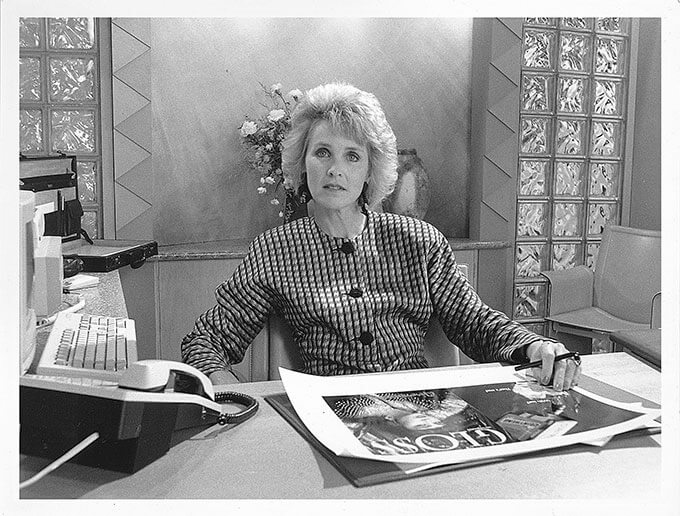
LISA CHAPPELL: I was 17. I’d rolled a friend’s car, and I had to pay for it… So I worked at a sharebroking office as the receptionist. I was absolutely appalling at that job, couldn’t add anything up to save myself. My very dodgy agent, who ended up running off with half my Gloss money, rang and said, “I’ve got you this audition.” I remember Peter Elliott was opposite me. I was quite intimidated by Peter, handsome thing he was. Is. Danielle Cormack was in the foyer; she was after me. I remember him saying, “You nailed it, and as Janice says, you look like Ilona.”
DANIELLE CORMACK (TANIA, CHELSEA’S BEST FRIEND): I was still at high school when I landed the role. It was my School Certificate year and I would take days off to step into this high-powered, high-fashion world with larger-than-life characters and hair to match. It was the complete antithesis to my school life. I certainly wouldn’t be winning any acting awards from that time, but I am incredibly proud to have been part of it.
JANICE FINN: I had my heart set on someone else for the role of Magda, but a friend of Kerry’s told me she was desperate to audition but couldn’t bring herself to ask. She turned up in very high heels, clutching an empty champagne glass and without doing much was Magda. She could make me laugh more than anyone.
SIMON PRAST: It’s wonderful as an actor to feel well cast, and to play to whatever strengths I have: the decadence and anarchic sense of humour and the bitchy side of me. I was so lucky to have in Miranda such a foil; Mrs Macbeth, Mrs Ambition, bearing down.
GEELING CHING: Chinese New Zealanders represented on New Zealand TV? Name them. Which is really weird considering how many Asians we have in this country. That is one thing that really stands out for me in the casting with Janice. Yes, I was “the China Girl”, but it was pretty brave to put an Asian face on TV.
JAMES GRIFFIN: We used to do colour-blind casting. We wouldn’t write specifically that this character was “Pacific Islander” or “Maori”, we’d just let the casting directors do their work.
PETER ELLIOTT: Yvonne Lawley as the Redfern matriarch had such grandeur and stature. When she came into the room, people were enormously respectful and she was wonderful.
ILONA RODGERS: She would do six scenes one after the other and I’d say, “Yvonne, how are you doing this?” “Bridge, darling. I play bridge!”
SIMON PRAST: Perhaps if there’s a commonality in the casting it’s that we were ambitious, competitive types and that added an edge to that work. Everyone in that cast was quite prepared not to be nice, and that is something that I think cuddly New Zealand was a bit confronted with.
MIRANDA HARCOURT: None of us had any idea that it was going to become this really life-changing experience. I had been in the performing arts my entire life, and I had watched other people be on the telly and it wasn’t life-changing. But it sort of left a mark for me; Gloss established me as a conniving bitch, and that idea has been with me for my whole life.
Craig Parker and Kevin Smith joined the show’s third series. Phil Keoghan also made a guest appearance, but a future Academy Award winner failed to make the cut.
JANICE FINN: I was doing this terribly polite thing where prior to every auditionee coming in, I would go and meet them. The lift doors opened, and Kevin came out. I was so overwhelmed by his gorgeousness that I stepped back and got my foot caught in an ashtray and fell over. I couldn’t speak. I didn’t care, I just knew that he had to be in it.
CRAIG PARKER: We had a fantastic launch party at some terribly cool 80s restaurant before we started shooting, and no onehad met Kevin. He turns up and everyone’s, like, “Oh God, he’s a superstar. He’ll be an utter wanker.”
SIMON PRAST: Talk about competitive. Janice said, “Oh, I’ve found this boy, he’s like a young Marlon Brando.” And of course that went down like a cup of cold sick. Oh, good God! But to meet Kevin was to love Kevin and he was more beautiful on the inside than he was on the outside, and that’s saying something.
PHIL KEOGHAN (HAMISH): I played a 21-year-old brat who got handed a job at the magazine. This didn’t go down too well with the other young guns. I remember I had a small cold and couldn’t help sniffing in the middle of a scene. I thought I’d blown the take but the director came out and said, “I love what you did with the sniffle; it was as if you tried not to do it but of course your character is clearly using cocaine and you just had the right amount of sniffle without going over the top!” That was the take they used.
JANICE FINN: An agent rang me and said that one of his people wanted to be on the show and that his name was Russ le Roq. I met him and turned him down. No thank you. He was being very morose, his agent did all the talking. I remember thinking, “Nah, don’t go much on him.” So there we are; yes, I turned down Russell Crowe.
The actor playing Maxine would be pivotal to the success of Gloss, both on screen and off. Ilona Rodgers had already stacked up credits on The Avengers, Doctor Who, The Beverly Hillbillies, The Sullivans, Sons and Daughters and Prisoner. Surprisingly, she wasn’t a shoo-in for the role.
JANICE FINN: It was definitely not going to be Ilona. I knew Ilona well and she is one of the nicest women in the world. Terribly nice. Good soul. She rang me and said she wanted to audition for it and I said, “Oh Ilona, you wouldn’t be right, you’re too nice, no no no.”
ILONA RODGERS: She knew I was a Baha’i. I’d shared digs with her so she’d seen me getting up early, saying my prayer, breaking the Baha’i fast and all this spiritual stuff… and I remember saying to her once, “Janice, this is what I’m striving for, it doesn’t mean I am it. We all have another persona.”
SIMON PRAST: Behind the face of a saint, she’s right up there with the rest of us.
LISA CHAPPELL: Ilona had a worldliness that none of us had, and that added to the truth of this elite class that we were playing — because it was complete bullshit from my end. I grew up in Mairangi Bay, my dad was a plumber, my mum was a housewife.
MIRANDA HARCOURT: Ilona used to give me a lift home, because I couldn’t drive, and I would spend hours at the end of the day sitting in the car with her giving me amazing advice: life advice, acting advice. She was so generous.
SIMON PRAST: She led the cast with great good humour, dignity and level-headedness. Being the mother — and being a mother herself — she acted as the mother and she looked out for us and she cared for us.
Gloss had women at the forefront, but the series also introduced a different kind of Kiwi male to New Zealand television screens, with polarising results.
SIMON PRAST: My father was in prison when I got the job, for a drugs crime. Dad tells a story that he had to sit there with a meat cleaver to change the channel to watch Gloss. “We’re watching this, boys.”
JANICE FINN: A lot of men did not like it. Let’s face it, they didn’t. It was very much a female thing, Gloss having all these bolshie women barging around being rude and saying mean things about people got up men’s noses. Male reviewers didn’t like it at all.
MICHAEL KEIR-MORRISSEY (BRADLEY REDFERN): I saw a review that said Janice had emasculated men. No, no, no. She made men sexy. Temuera Morrison was never more sexy than in that show. I really think it was the only chance he has had to be what he is — a sexual being and a lover of women.
CRAIG PARKER: We were shooting a scene and Janice said, “Stop, stop, it’s not working, there’s no sex! There’s no sex! What’s going on? I’ve seen you on stage, you’re sexy there, why aren’t you doing it here?” She drags me up to wardrobe and says, “Look at him, he looks like some matinee idol!” So they found a shirt that actually had “SEX” written on one sleeve, and “DEFENDER” on the other, and then she dragged me downstairs and said, “Okay, now act!”
Fashion was the centre of the Gloss world, which meant a massive workload for TVNZ’s in-house costume designers Enid Eiriksson and Sara Beale, assisted by Liz Mitchell (not yet a designer herself). They created more than 200 original outfits and, boldly for the time, dressed their male characters in brightly coloured suits. Gloss also gave local designers a nationwide platform.
ENID EIRIKSSON: We had 15 core cast, plus extras. It was a huge workload, so as well as our bespoke clothing made in our workroom, we had to borrow many garments.
LIZ MITCHELL: Initially, people were a little bit “uhhh”, but as it gained momentum and popularity, people in the fashion industry were keen to support it. I used to just truck around and see Francis at World, go into Trelise’s workshop, helping different businesses with exposure.
TRELISE COOPER: I had been going about three years by then. I had two stores and I was already dressing Kerry Smith for Lotto. Enid and Liz put the proposal to me and at that time I had way more flexibility to stop and make stunning outfits. I would work with Ilona; we would concoct all these beautiful garments that fitted the character and the things that Maxine was doing in that episode. I loved being around her.
ILONA RODGERS: I was a farmer’s wife when I got Gloss. We were bagging pumpkins at the time, and I always had to wear gloves because my hands were so rough. I would get up every morning, walk through the cutty, get sheep shit all up my trousers and get into the car and go to work and be put in these amazing Trelise Cooper clothes. I looked fantastic. I mean, I had earrings down to here! I used to say to the farmers’ wives when I got back: “Girls, this is my doggy day.”
PHIL KEOGHAN: Seriously, though, what were we thinking? The bright colours, big lapels, the funky male brooches. The Speight’s boys down south must have wondered what the hell we were doing in impractical clothing not exactly suitable for rolling up your sleeves to help out during mustering. I’m sure there were a few calling us Auckland city wankers!
Before Gloss, fame in New Zealand amounted to Edmund Hillary types, “practical celebrities who achieved visible things”, as Miranda Harcourt puts it. Fuelled by stories the producers would feed to the press, Gloss birthed a new celebrity culture, even if the actors’ payslips didn’t quite match their fame.
ILONA RODGERS: The day I realised what we were was when one of the fans threw a dance to which we were invited as
the cast. It was a Gloss ball, and Trelise gave me — well she didn’t, she lent me
— this beautiful red dress. And I remember we walked in and all these people were dressed up in Gloss clothes! Suddenly it was like, “Whoa.”
GEELING CHING: It was the beginning of the cult of personality and it was just kind of bizarre. Without trying to sound like a wanker, I was kind of used to it from having done the China Girl video and having gone overseas with David [Bowie]. I had that small taste of it, but I just wasn’t expecting it in New Zealand.
PETER ELLIOTT: We’d go to events as “the cast” and we’d go along as basically a single person, even though I was married, which was weird but it was the way they liked it. We were all picked up and thrown into the maelstrom. Really, we were the forerunners of celebrity wankers in this country.
LISA CHAPPELL: For my first series I got paid $600 a week. Shit yeah, it was a lot for me. It didn’t last because it was only for three months of the year. I’d have to go and work at Les Mills between series, and people always thought you were rich because you did Gloss.
CRAIG PARKER: I think I was probably on $400 a week, but we had the promise of residuals. It was the last time there was some sort of residual deal in New Zealand.
PETER ELLIOTT: Gloss sold offshore to something like 23 countries. People saw Gloss in Spain and Latvia and strange places like that. We’d never had that! There were people having Gloss parties around the world who would occasionally phone us up.
GEELING CHING: I saw it in Belgium with my voice dubbed over! I’d gone over to France for some reason — it might have been a modelling job — and found myself in Belgium watching TV in a hotel room and going, “Oh my god, that’s me but that’s not my voice.” It was surreal.
SIMON PRAST: We had little star cards and I can remember that where I was staying at the time, I didn’t have a dryer, so I’d go home on a Sunday and I’d do all my washing and ironing and I would literally sign hundreds of these star cards with a gold pen — “love, Simon”.
JAMES GRIFFIN: It was really interesting for me to be the invisible one who would get ushered through the velvet ropes with them. It was a new phenomenon, the star power of these people. What horrified me the most was the night Kevin Smith got beaten up in Queen St. As this person was beating him up, he said, “You’re not so famous now, are you, cunt?” There was a dark side from the New Zealand psyche that came out, I reckon.
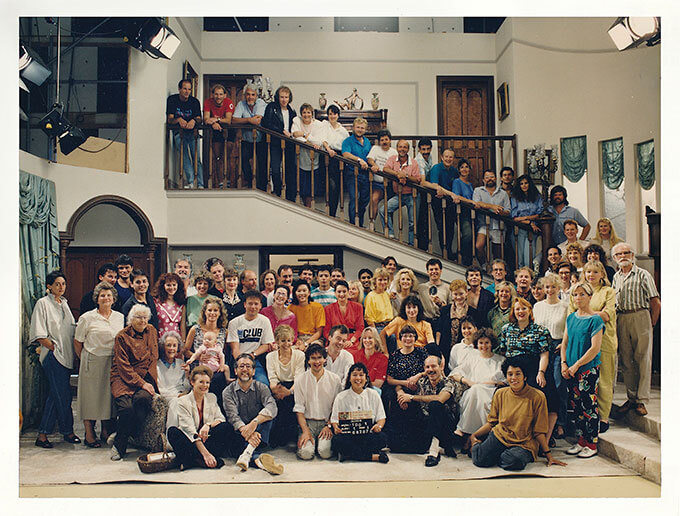
Things were taking a dark turn on screen, too. As Gloss entered its third series, the writers had killed off one of their core cast characters, Bradley Redfern, and they were about to do it again.
MICHAEL KEIR-MORRISSEY: At the time, being a totally theatre person, I didn’t see soap as a particularly valid thing. But by the time it was about to happen I was starting to love the work, and then Janice called me into an office and told me.
JANICE FINN: It is a hard one, frankly. We wanted something big. That was really what it was, we needed a big event. And I know he wasn’t happy about it, at all.
MICHAEL KEIR-MORRISSEY: You’ve gotta kill off important people, otherwise the death is not really worth it. I was sorry, but I played my part — by dying — in pushing the show forward.
Becoming corrupted had driven Gemma insane, and in the final episode of series three, she walked into the ocean intending to commit suicide.
JAMES GRIFFIN: I wrote that episode. I mainly remember it because there were apparently a whole bunch of people yelling their advice when they were shooting that night.
MIRANDA HARCOURT: Yes, we shot Gemma’s suicide scene on the beach at Devonport, across the road from that pub on the corner. It was a Friday night, it was a lovely evening, and everybody in the pub came out with their beers and lined the beach to watch Gemma drown. They were cheering, “Yeaaahhh, die, bitch!” I will never forget that.
JAMES GRIFFIN: Did she die? I think possibly she would’ve got out far enough and then her survival instincts would have kicked in.
SIMON PRAST: Oh, of course she survived. Of course. She would have got just past nipple height and gone, “Oh no, fuck you, I’ll be back.”
CRAIG PARKER: Gemma lives always. Nothing would kill Gemma. She would find a way to rise again.
We’ll never know if Gemma lived or died. In 1989, with deregulation in full swing and TV3 about to launch, Australian programming consultants had been brought in to shake up TVNZ’s roster. After a brief discussion about whether Gloss could be rejigged as a half-hour weeknight soap to compete with whatever TV3 had in mind, they canned the series.
ILONA RODGERS: It was Lisa’s 21st. I’ll always remember that day. We’d been told formally that we were going into a fourth series. I’d signed a contract.
LISA CHAPPELL: I had a beautiful bouquet of flowers and lots of hugs and kisses, and after the cake Janice said, “Come out to the cafeteria, we’ve got an announcement to make.”
ILONA RODGERS: It was so Gloss, wasn’t it? The fact that we were celebrating a 21st and then they come in. Yeah, it was awful, it was really awful. I think we had to go on working. That 21st turned into a funeral.
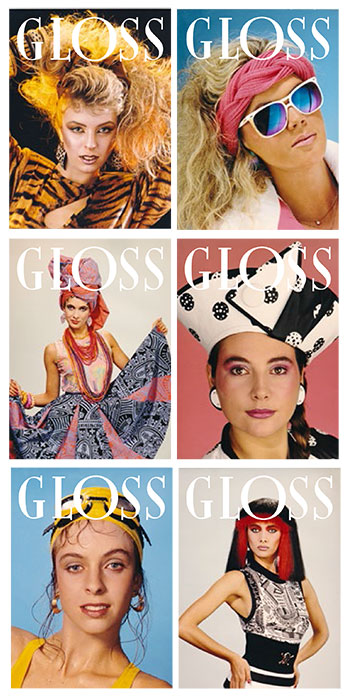
JAMES GRIFFIN: I was in London and I got a phone call from a whole bunch of rather drunken actors from said 21st, having just got the news. And then when I got home, they’d transferred the charge to my phone, and there was a $120 phone bill.
GEELING CHING: We had thought, “Oh, gosh, we’ve gone past two series, this is it! We could actually be set up for life!” I think most of us were at that point in negotiation, talking with our agents, going, “We could have real leverage here. This could be really important for the industry.” But then, no. Back to reality. Back to having to pay for my own meals.
SIMON PRAST: I’d spent all my money in anticipation of a fourth series that didn’t come, and so I had to go and be a waiter at Vinnies. So I’m waitering there and my tips are nil. Finally, someone tells me, “Oh, we think you own this place, and that’s why we’re not giving you a tip.” So from that moment on, I had to tell people the sad, awful truth as to why I’m here, and it’s not because I own the joint. Tip up!
PETER ELLIOTT: It really was a death and we were grief-stricken, because it was something that we all put an enormous amount of effort into and loved.
JANICE FINN: I don’t remember who actually made that decision — I’m not sure I knew at the time. We were very keen to go straight into a fourth series, no question. Whoever the Australian was, somebody then asked him in an interview, “It was a great shame, why did it go?” and he said, “Oh, the producer said it couldn’t go on.” That wasn’t true. I was certainly uneasy about the idea of half-hour episodes, but I resent the idea that I canned it. I didn’t have the power to can anything.
ILONA RODGERS: You know why we were stopped? I landed up at a literary luncheon for somebody and the Australian — can’t remember his name — he was sitting next to me and he said, “Oh look, I’m sorry that I canned your programme. Too many bloody sheilas.”
JANICE FINN: No! I’d never heard that!
MICHAEL KEIR-MORRISSEY: So many of the men in television hated Janice because she had done something they had never achieved. Down in Otago, the students stopped their swotting so they could watch Gloss. People in South Auckland had Gloss parties. The men running television had never managed to achieve that. I think many of them were quite jealous of Janice because of that. Jealousy is a vital part of the attack on women. “Fuck, how can they do that and I have never done that?”
The 55 episodes of Gloss are as hard to find as the bottles of Scotch that kept disappearing from Alistair Redfern’s diner. A few excerpts at NZ On Screen and three episodes that some bloke ripped on YouTube are all that’s available. The reason: the aforementioned residuals clause in the actors’ contracts.
CRAIG PARKER: It’s very apt that a show that was about greed and capitalism was the last one that benefited from everything sensible and slightly socialist that went before. I’m a great believer in residuals. I think it’s a really important thing for the industry. For Gloss to play again, it would probably only cost about $2.50 for each of us, but it’s nothing to do with the money. I very strongly believe it’s a principle thing.
LISA CHAPPELL: We’ve been fighting so long to get residuals again. But I think, personally, we should all just have a meeting. I can’t speak for everyone but I’d be very happy for people to be able to view it again, because everywhere I go it’s “Chelsea! I remember you from Gloss!”
Not long ago, South Pacific Pictures pitched an updated Gloss, with Chelsea Redfern taking over the lead from her mother. Chris Bailey filmed a teaser with Lisa Chappell.
CHRIS BAILEY: I shot it myself because I was doing it on the cheap. I talked a couple of people into coming in and we costumed Lisa up and we did it in half a day. It was really good, actually. But I think TVNZ went down the Filthy Rich path instead. Reboots are dangerous things in many ways, but I actually thought it could work really well because it was a new generation.
LISA CHAPPELL: I have to say that leaving them wanting more has left this shroud of magic around Gloss. But, I would love to do a version of Gloss now because there is just so much to feed on with this weird world we live in of celebrity and social media. The themes that we were exploring that were new themes for New Zealand 30 years ago are just so in our face now and with good writers I think it would be really interesting to do.
SIMON PRAST: I think it would be sad for the audience to see us all bald and fat and old. Who needs to look in a mirror? We should all be forever young. Our memories are much better than the awful truth.
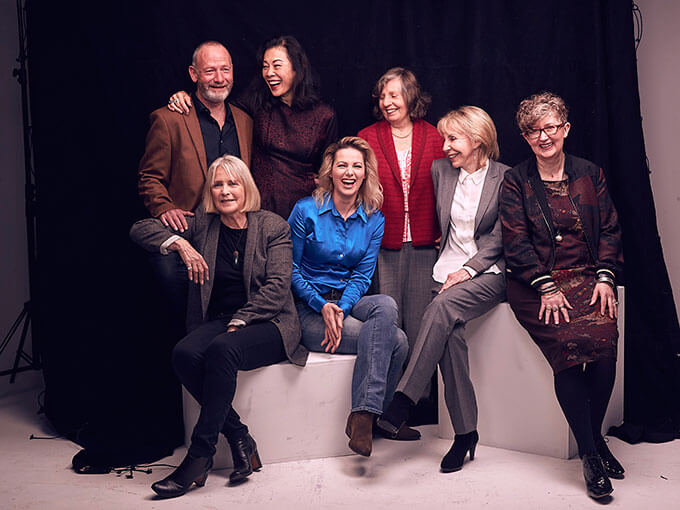
Where are they now?
Chris Bailey is producing the third season of the Australian-New Zealand TV co-production 800 Words.
Lisa Chappell went on to greater fame as Claire McLeod on the hit Australian TV series McLeod’s Daughters. She will next be seen on stage in Two at The Pumphouse.
Geeling Ching has long been a doyenne of Auckland’s hospitality scene, recently overseeing Halsey St Kitchen at ASB Waterfront Theatre.
Trelise Cooper was made a Dame Companion of the New Zealand Order of Merit in 2013. Her fashion labels, including Trelise Cooper, Cooper and Little Cooper, are worn around the world.
Danielle Cormack is enjoying huge success across the Tasman, most recently as Bea Smith in the TV series Wentworth.
Enid Eiriksson designed jewellery and fashion accessories for many years after TVNZ’s costume department was shut down, and is now a sculptor in Christchurch.
Peter Elliott appears in 800 Words and can be heard regularly on RNZ National’s The Panel.
Janice Finn has returned to her first love, theatre. With her company Tadpole Productions, she is directing Lisa Chappell in Jim Cartwright’s play Two, opening at The Pumphouse on October 26.
James Griffin created The Almighty Johnsons and co-created Outrageous Fortune, Westside and 800 Words.
Miranda Harcourt is now a renowned acting coach and the co-director with her husband, Stuart McKenzie, of the film adaptation of Margaret Mahy’s The Changeover (see review, page 105).
Michael Keir-Morrissey went into voice work at Ilona Rodgers’ suggestion after being killed off in Gloss. He became the distinctive “voice of Telecom” for many years, and now lives and writes in Wairarapa with the love of his life, Gregory.
Phil Keoghan is a documentary maker and the multi Emmy-winning producer and host of television series The Amazing Race.
Liz Mitchell left TVNZ to work as a freelance costume designer, before launching her own award-winning design label, currently based in Grey Lynn.
Craig Parker starred as Guy Warner on Shortland Street, made his international name as Haldir in the Lord of the Rings film trilogy, and has just concluded a leading role as Lord Stéphane Narcisse in the US fantasy series Reign.
Simon Prast founded Auckland Theatre Company and organised the first Auckland Festival. He continues to act on stage and screen, and will be seen in the forthcoming second season of the Netflix series Roman Empire: Reign of Blood. He is also appearing in Othello and Much Ado About Nothing in the Pop Up Globe’s first Melbourne season.
Ilona Rodgers lives in Warkworth, sits on many boards, and continues to act, most recently as Nana Pat in Dirty Laundry.
Kerry Smith passed away in 2011 of melanoma.
Kevin Smith was fatally injured in a fall in 2002 while in China shooting a film.
This is published in the September- October 2017 issue of Metro.

